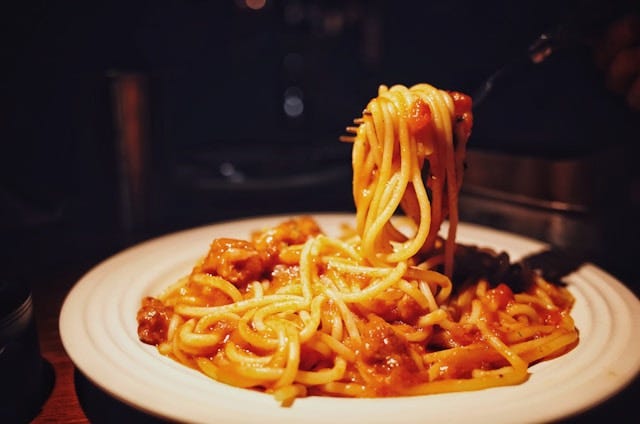Beef Spaghetti
Glimmers of Mrs. Green, Home Ec teacher

Whenever I cook ground beef, I break up the meat into pea-sized nuggets with a wooden spoon—tap, tap, tap, tap—then stir—and think of Mrs. Green. In high school, students took Home Economics, or “Home Ec.” I chose a cooking class and spent 40 minutes every week watching Mrs. Green whip up tacos, chili, spaghetti, Bisquick biscuits, and French toast with Wonder bread if we were lucky.
We sat in our chairs lined up in curved short rows while Mrs. Green prepped and assembled her ingredients on a rolling cart equipped with an overhead mirror. Small bowls sat on the top of her cart: salt, black pepper, dried oregano, chopped garlic, and minced onions. The lower level of her cart hosted two large cans of Del Monte tomato sauce, tomato paste, spaghetti noodles, and packaged ground beef: beef spaghetti.
Mrs. Green had pale skin, short black hair smoothed around her ears and neck, brown eyes, and thin lips filled in with red lipstick. She wore fitted skirts and polyester long-sleeved tops covered with a yellow apron. Her voice was high-pitched and reminded me of her personality. She focused on her ingredients mostly, avoiding eye contact with the small crowd of kids facing her. Her smile was pinched and fleeting and didn’t warm up her eyes.
Students never cooked in class, and I don’t remember eating much, either. We sampled or had a taste, leaving us hungry and eager to grab that candy bar, or half sandwich left in our locker. Perhaps much of my memory comes from that feeling of hunger and longing—imprinted then—triggered later in my life by the sensory experiences of cooking.
It was near the end of the school year when I saw Mrs. Green, not long after her young son died of cancer. She stood at her cart and showed us how to make beef spaghetti. She had her usual coolness, then I saw something unexpected.
She wore an oversized sweater and trim pants. She didn’t bother putting on her yellow apron. Her eyes were soft, and her lips pale without her usual bright red lipstick. Her hair was tousled instead of smooth. She didn’t pretend to smile and went through the motions of prepping, mixing, and simmering. She threw out the cans of used sauce into the white plastic bin next to her cart, and red sauce splashed and dribbled over the side of the can.
We never talked. I doubt Mrs. Green even looked at me, yet she stayed with me, a glimmer reflecting through the steam of frying ground beef.
What does it mean to see? We rely on our senses to make sense of the world. Still, we experience only a minute sliver, the tiniest fragments to construct our consciousness—the universe down to a person, to ants crawling on dirt, to dewdrops suspended on a bent leaf, to dust—all are, in a sense, simply glimmers in time and space.
We never see a person. We never know the whole, only glimmers reflected by our own consciousness.


I love your description of Mrs Green's smile-not reaching her eyes.
Another moving piece from Shirley Bekins.